- Home
- Elmore Leonard
Rum Punch Page 2
Rum Punch Read online
Page 2
“You have cash,” Max said, “what do you need me for?”
“Come on,” Ordell said, “you know how they do. Want to know where you got it, then keep out a big chunk, say it’s for court costs. Pull all kind of shit on you.”
“It’ll cost you a thousand for the bond.”
“I know that.”
“Who’s it for, a relative?”
“Fella name Beaumont. They have him up at the Gun Club jail.”
Max Cherry kept staring from his desk, hunched over some. He had a computer there and a typewriter and a stack of file folders, one of them open.
“Was sheriff deputies picked him up Saturday night,” Ordell said. “It started out drunk driving, but they wrote it ‘possession of a concealed weapon.’ Had a pistol on him.”
“Ten thousand sounds high.”
“They ran his name and got a hit, saw he’s been in before. Or they don’t like it he’s Jamaican. You know what I’m saying? They afraid he might take off.”
“If he does and I have to go to Jamaica after him, you cover the expenses.”
This was interesting. Ordell said, “You think you could pick him up down there? Put him on a plane, bring him back?”
“I’ve done it. What’s his full name?”
“Beaumont. That’s the only name I know.”
Max Cherry, getting papers out of his drawer, looked over this way again, the man no doubt thinking, You putting that kind of money up and you don’t even know his name? Ordell got a kick out of people wondering about him, this man—look at him—holding back from asking the question. Ordell said, “I have people do favors for me don’t even have names outside of like Zulu, Cujo, one they call Wa-wa. Street names. You know what they call me sometime? Whitebread, account of my shade. Or they say just ‘Bread’ for short. It’s okay, they not disrespecting me.” See what the man thought of that.
He didn’t say. He picked up his phone.
Ordell smoked his cigarette, watching as the man punched numbers, and heard him ask for the Records Office, then ask somebody if they’d look up the Booking Card and Rough Arrest on a defendant named Beaumont, saying he believed it was the surname but wasn’t sure, check the ones came in Saturday night. He had to wait before getting what he wanted, asking questions and filling out a form on his desk. When he was done and had hung up the phone he said, “Beaumont Livingston.”
“Livingston, huh?”
“On his prior,” Max Cherry said, “he did nine months and is working out four years probation. For possession of unregistered machine guns.”
“You don’t tell me.”
“So he’s violated his probation. He’s looking at ten years plus the concealed weapon.”
“Man, he won’t like that,” Ordell said. He drew on his cigarette and dropped it in the coffee mug. “Beaumont don’t have the disposition for doing time.”
Now Max Cherry was staring again before he said, “You ever been to prison?”
“Long time ago in my youth I did a bit in Ohio. Wasn’t anything, stealing cars.”
“I need your name too, and your address.”
Ordell told him it was Ordell Robbie, spelled it for him when the man asked, and said where he lived.
“That a Jamaican name?”
“Hey, do I sound like one of them? You hear them talking that island potwah to each other, it’s like a different language. No, man, I’m African-American. I used to be Neegro, I was cullud, I was black, but now I’m African-American. What’re you, Jewish, huh?”
“You’re African-American, I guess I’m French-American,” Max Cherry said. “With maybe some New Orleans Creole in there, going way back.” Now he was shuffling through papers on his desk to find the ones he wanted. “You’ll have to fill out an Application for Appearance Bond, an Indemnity Agreement, a Contingent Promissory Note . . . It’s the one, if Beaumont skips and I go after him, you pay the expenses.”
“Beaumont ain’t going nowhere,” Ordell said. “You gonna have to figure out some other way to skim, make more than your ten percent. I’m surprised you don’t try to double the fee account of he’s Jamaican. . . .”
“It’s against the law.”
“Yeah, but it’s done, huh? You people have your ways. Like not refunding the collateral.” Ordell got up, went over to the man’s desk with the athletic bag he bought at the airport souvenir shop, and took a bundle of currency out of it, old bills held together with a rubber band. “Hundred times a hundred,” Ordell said, “and ten more for your cut. You do all right, huh? What I like to know is where you keeping my money till I get it back. In your drawer?”
“Across the street at First Union,” Max Cherry said, taking the bills and working the rubber bands off. “It goes in a trust account.”
“So you gonna make some money extra on the interest, huh? I knew it.”
The man didn’t say yes or no, busy counting hundred-dollar bills now. When he was done and Ordell was signing the different papers, the man asked if he was going out to the jail with him. Ordell straightened up and thought about it before shaking his head.
“Not if I don’t need to. Tell Beaumont I’ll be in touch.” Ordell buttoned his double-breasted sport jacket, his canary one he wore over the black T-shirt and black silk trousers this afternoon. He wondered how tall this Max Cherry was, so he said, “Nice doing business with you,” and stuck out his hand without reaching toward him. Max Cherry rose up to stand six feet and some, a speck taller than Ordell, with a big mitt on him Ordell shook and let go. The man nodded, that was it, and stood waiting for him to leave.
Ordell said, “You know why I come here, not someplace else? Friend of mine I understand does some work for you.”
“You mean Winston?”
“Another fella, Louis Gara. He’s my white friend,” Ordell said, and smiled.
Max Cherry didn’t. He said, “I haven’t seen him today.”
“Yeah, well, I’ll catch him sometime.” Ordell picked up his bag and started for the door. He stopped and looked back. “I got one other question. What if, I was just thinking, what if before the court date gets here Beaumont gets hit by a car or something and dies? I get the money back, don’t I?”
What he was saying was, he knew he’d get it back. The kind of guy who worked at being cool, but was dying to tell you things about himself. He knew the system, knew the main county lockup was called the Gun Club jail, after the road it was on. He’d served time, knew Louis Gara, and drove off in a Mercedes convertible. What else you want to know? Ordell Robbie. Max was surprised he’d never heard of him.
He turned away from the front window, went back to his office to type up bail forms.
The first one, the Power of Attorney. Max rolled it into his typewriter and paused, looking at his problem. It would hit him in the eye every time he filled out a form that had glades mutual casualty company printed across the top.
The Power of Attorney verified Max Cherry as the insurance company’s licensed surety-bond representative, here, in the matter of Beaumont Livingston. The way it worked, the insurance company would get one third of the ten percent premium and put a third of it into a buildup fund to cover forfeitures.
If Max wrote fifty thousand dollars’ worth of bail bonds a week, he’d clear five grand less expenses and the one third that went to Glades Mutual in Miami. It was a grind, but good money if you put in the hours.
The problem was that after representing Glades for the past nineteen years, no complaints either way, the company was now under new management, taken over by guys with organized crime connections. Max was sure of it. They’d even placed an excon in his office, Ordell Robbie’s friend Louis Gara. “To help out,” this thug from Glades Mutual said, a guy who didn’t know shit about the business. “Go after some of those big drug-trafficking bonds.”
“What those people do,” Max told the guy, “is skip as soon as they’re bonded.”
The guy said, “So what? We got the premium.”
“I don’
t write people who I know are gonna forfeit.”
The guy said, “If they don’t want to show up in court, that’s their business.”
“And it’s my business who I write,” Max told him. The guy from Glades said, “You got an attitude problem,” and gave him Louis to hang around the office, a convicted bank robber just out of prison.
Winston came in while Max was preparing the forms. Winston Willie Powell, a licensed bondsman following a 39 and 10 record as a middleweight. He was light heavy in retirement, short and thick, with a bearded black face so dark it was hard to make out his features. Max watched him, at the other desk now, unlock the right-hand drawer and take out a snub-nosed .38 before he looked over.
“Have to pick up that little Puerto Rican housebreaker thinks he’s Zorro. Has the swords on his wall? Man lies to his probation officer, she violates him, we bond him, and then he don’t show up for his hearing. I called Delray PD, said I might need some backup, depending how it goes. They say to me, ‘He’s your problem, man.’ They don’t want to mess with those women live there. Touch Zorro, they try to scratch your eyes out.”
“You want help? Get Louis.”
Winston said, “I rather do it myself,” shoving the .38 into his waistband and smoothing his ribbed knit T-shirt over it. “Who you writing?”
“Concealed weapon. Ten thousand.”
“That’s high.”
“Not for Beaumont Livingston. They caught him one time with machine guns.”
“Beaumont—he’s Jamaican he’s gone.”
“This African-American gent who put up cash says no.”
“We know him?”
“Ordell Robbie,” Max said and waited. Winston shook his head. “Where’s he live?” “On Thirty-first right off Greenwood. You know that neighborhood? It’s kept up. People have bars on their windows.”
“You want, I’ll check him out.”
“He knows Louis. They’re old buddies.”
“Then you know the man’s dirty,” Winston said. “Where’s Beaumont live?”
“Riviera Beach. He’s hired help but worth ten grand to Mr. Robbie.”
“Wants his man sprung ’fore he gets squeezed and cops to a deal. I can bring him out when I take Zorro.”
“I’m going up anyway. I have to deliver Reggie.”
“Missed his hearing again? They beauties, aren’t they?”
“He says it was his mother’s birthday, he forgot.”
“And you believe that shit. I swear, there times you act like these people are no different than anybody else.”
“I’m glad we’re having this talk,” Max said.
“Yeah, well, I’m enough irritated the way you act,” Winston said, “you better not get smart with me. Like nothing bothers you. Like not even Mr. Louis Gara, the way you let him waste your time. Let him smoke his cigarettes in here.”
“No, Louis bothers me,” Max said.
“Then throw his ass out and lock the door. Then call that crooked insurance company and tell them you’re through. You don’t, they gonna eat you up or get you in trouble with the state commission, and you know it.”
“Right,” Max said. He turned to his typewriter.
“Listen to me. All you got to do is stop writing their bonds.”
“You mean quit the business.”
“For a while. What’s wrong with that?”
“If you haven’t looked at the books lately,” Max said, “we’ve got close to a million bucks out there.”
“It don’t mean you have to work. Ride it out. See, then when it’s all off the books you start over.”
“I got bills to pay, like everybody else.”
“Yeah, but you could do it if you wanted; there ways. What I think is, you tired of the business.”
“You’re right again,” Max said, tired of talking about it.
“But you don’t see a way to get out, so you act like nothing bothers you.”
Max didn’t argue. Nine years together, Winston knew him. It was quiet and then Winston said, “How’s Renee doing?” Coming at him from another direction. “She making it yet?”
“You want to know if I’m still paying her bills?”
“Don’t tell me what you don’t want to.”
“Okay, the latest,” Max said. He turned from his typewriter. “I walk in, I just got back from seeing the judge about Reggie, she calls.”
He paused as Winston sat down and hunched over the desk on his arms, Winston staring at him now, waiting.
“She’s at the mall. Something she ordered, three olive pots, arrived COD and she needs eight twenty right away. That’s eight hundred and twenty.”
“What’s a olive pot?”
“How should I know? What she wanted was for me to drop whatever I was doing and bring her a check.”
Winston sat there staring at him, his head down in those heavy shoulders. “For these olive pots.”
“I said, ‘Renee, I’m working. I’m trying to save a young man from doing ten years and I’m waiting for him to call.’ I try to explain it to her in a nice way. You know what she said? She said, ‘Well, I’m working too.’ ”
Winston seemed to smile. It was hard to tell. He said, “I was out there one time. Renee act like she didn’t see me and I’m the only person in there.”
“That’s what I mean,” Max said. “She says she’s working—doing what? You never see anybody unless she’s got the wine and cheese out. You know what I mean? For a show. Then you have all the freeloaders. You see these guys, they look like they live in cardboard boxes under the freeway, they’re eating everything, drinking the wine . . . You know who they are? The artists and their crowd. I’ve even recognized guys I’ve written. Renee’s playing like she’s Peter Pan, has her hair cut real short, and all these assholes are the Lost Boys. The place clears out, she hasn’t sold one flicking painting.”
“So what you’re telling me,” Winston said, “you’re still supporting her habit.”
“She’s got a Cuban guy now, David, I mean Daveed, she says is gonna be discovered and make it big, any day now. The guy’s a busboy at Chuck and Harold’s.”
“See, what I don’t understand,” Winston said, “you let a woman don’t weigh a hundred pounds beat up on you. It’s the same as how you treat some of these lowlife assholes we dealing with. They give you all kind of shit and you go along with it. Then I see you pick up a guy that skipped, some mean-drunk motherfucker and you cuff him, no problem, and take him in. You understand what I’m saying? Why don’t you tell the woman to pay her own bills or you gonna divorce her? Or go ahead and divorce her anyway. You don’t live together. What’re you getting out of being married? Nothing. Am I right? ’Less you still going to bed with her.”
“When you’re separated,” Max said, “you don’t get to do that. You don’t want to.”
“Yeah, well, I imagine you do all right with the ladies. But where she getting hers, off the artists? This Cuban busboy, Da-veed? If she is, that’s a good reason to divorce her. Catch her going out on you.”
“You’re getting personal now,” Max said.
Winston looked surprised. “Man, we been getting nothing but personal. It’s your personal life has you messed up, one problem pressing on another. The way Renee has hold of your balls, you don’t have the strength to get the insurance company off your back. All the money you put in her picture store, paying her bills, you could shut down here and live on it till you start up again clean, with a different insurance company. You know I’m right too, so I’m not gonna say another word.”
“Good,” Max said. He turned to the Power of Attorney form in his typewriter.
“You take her the check she wanted?”
“No, I didn’t.”
“She call back?”
“Not yet.”
“She cry and carry on like she does?”
“She hung up on me,” Max said. “Look, I have to finish this and get out of here.”
“Don’t let me disturb y
ou.”
Max started typing again.
He heard Winston say, “Hey, shit—” and looked over to see him standing at the desk now holding his coffee mug.
“That goddamn Louis, you see what he done? Put his cigarette butt in here. I’m gonna punch him right in his smokin’ mouth.”
Max turned back to the form, glades mutual casualty printed across the top. He said, “I know how you feel. But when you hit an ex-con who’s done three falls, they say you better kill him.”
3
Ordell asked one of his jackboys to get him a car with keys in it and leave it in the Ocean Mall parking lot over by the beach. The jackboy asked him what kind of car he wanted. Ordell said, “One has a big trunk with a shotgun in it.”
He liked jackboys because they were crazy. They made their living ripping off street dealers for their blow and change and busting into crack houses with assault weapons. Jackboys liked Ordell because he was cool, not some homey everybody knew; the man was big-time from Detroit, had different women he stayed with as it suited him, and could deliver you a full-automatic weapon on two days notice. So now some of the jackboys worked for Ordell, picking up special kinds of guns he needed to fill orders. The one who was getting him the car, Cujo, called him that Tuesday evening where he was staying with one of his women to say it was there waiting, an Olds Ninety-Eight, 12-gauge in the trunk.
Ordell said, “The car, if it’s clean now it won’t be after.”
Cujo said, “It don’t matter, Bread, it’s stole. Was a brother had it that’s dead from the other night. You hear of it? Policeman shot him both in the front and in the back. We try to get him from the house, but he bled out on us so we left him.”
“I saw it in the paper,” Ordell said. “The cop told them yeah, when a man is shot sometimes he’ll spin around on you, it ain’t unusual, and that’s what happened. But where did he shoot him first, in the front or in the back?”
Cujo said, “Yeaaah . . . that’s right, huh?”
You could mess with a jackboy’s head, get him to think what you wanted, their brains cooked from doing crack.
Ordell thanked him for the car and Cujo said, “Bread? They’s a piece underneath with the keys, case you want it. Belonged to the brother was shot dead.”

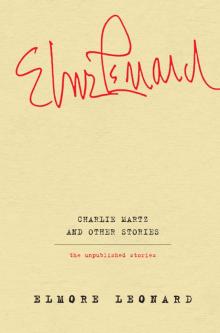 Charlie Martz and Other Stories: The Unpublished Stories
Charlie Martz and Other Stories: The Unpublished Stories Elmore Leonard's Western Roundup #2
Elmore Leonard's Western Roundup #2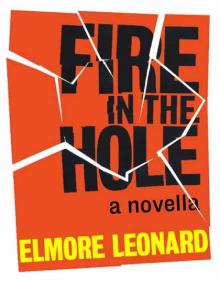 Fire in the Hole
Fire in the Hole Tishomingo Blues (2002)
Tishomingo Blues (2002)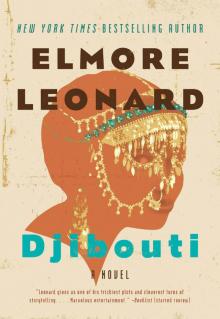 Djibouti
Djibouti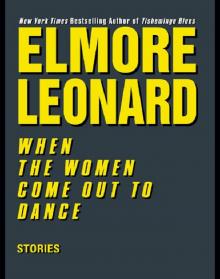 When the Women Come Out to Dance: Stories
When the Women Come Out to Dance: Stories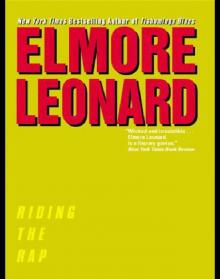 Riding the Rap
Riding the Rap Moment of Vengeance and Other Stories
Moment of Vengeance and Other Stories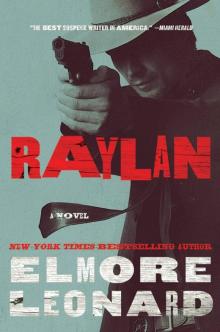 Raylan
Raylan Touch
Touch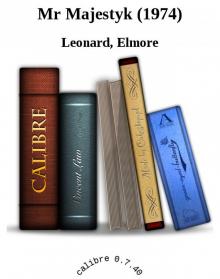 Mr Majestyk
Mr Majestyk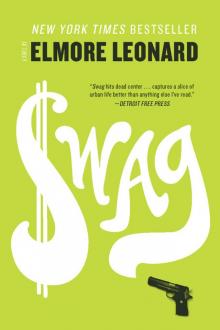 Swag
Swag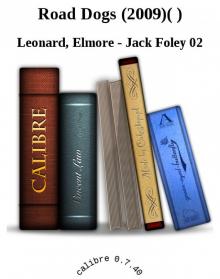 Road Dogs
Road Dogs La Brava
La Brava The Hot Kid
The Hot Kid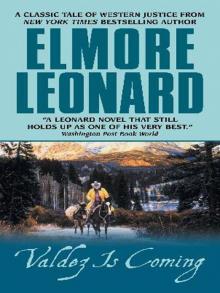 Valdez Is Coming: A Novel
Valdez Is Coming: A Novel Be Cool
Be Cool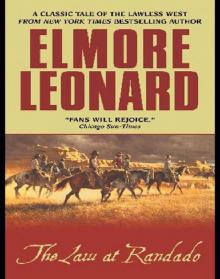 The Law at Randado
The Law at Randado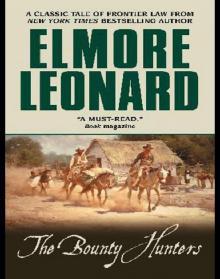 The Bounty Hunters
The Bounty Hunters When the Women Come Out to Dance
When the Women Come Out to Dance 310 to Yuma and Other Stories (1953)
310 to Yuma and Other Stories (1953)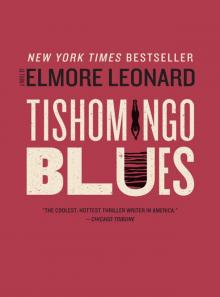 Tishomingo Blues
Tishomingo Blues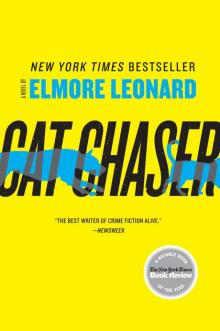 Cat Chaser
Cat Chaser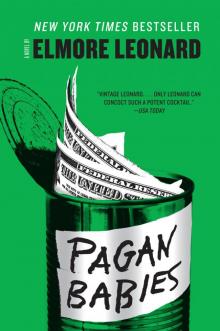 Pagan Babies
Pagan Babies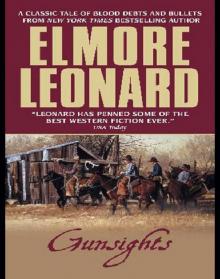 Elmore Leonard's Western Roundup #1
Elmore Leonard's Western Roundup #1 52 Pickup
52 Pickup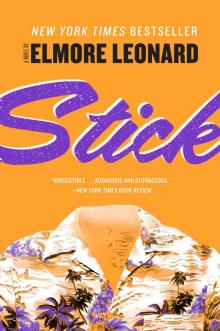 Stick
Stick The Moonshine War
The Moonshine War Valdez Is Coming
Valdez Is Coming City Primeval
City Primeval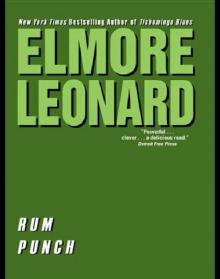 Rum Punch
Rum Punch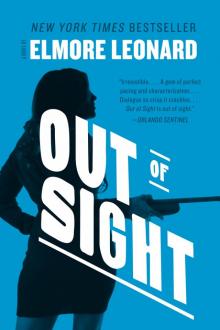 Out of Sight
Out of Sight Naked Came the Manatee (1996)
Naked Came the Manatee (1996)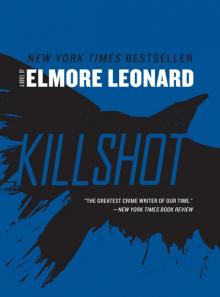 Killshot
Killshot Cuba Libre
Cuba Libre Forty Lashes Less One
Forty Lashes Less One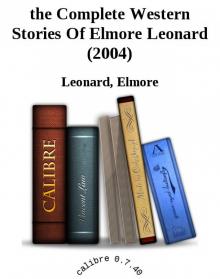 The Complete Western Stories of Elmore Leonard
The Complete Western Stories of Elmore Leonard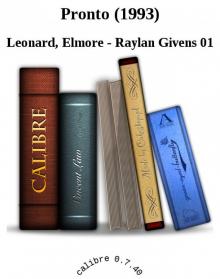 Pronto
Pronto Split Images
Split Images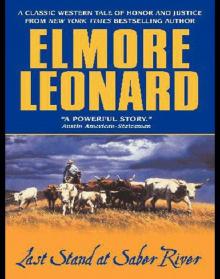 Last Stand at Saber River
Last Stand at Saber River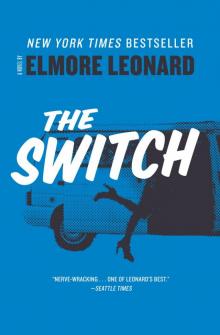 The Switch
The Switch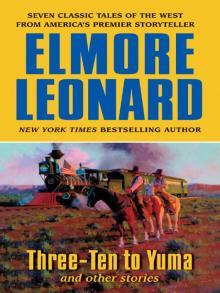 Three-Ten to Yuma and Other Stories
Three-Ten to Yuma and Other Stories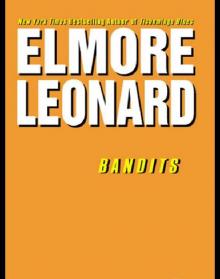 Bandits
Bandits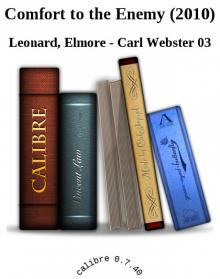 Comfort to the Enemy and Other Carl Webster Stories
Comfort to the Enemy and Other Carl Webster Stories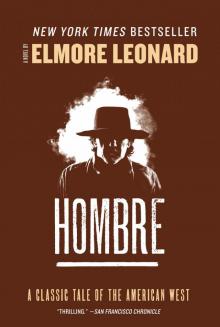 Hombre
Hombre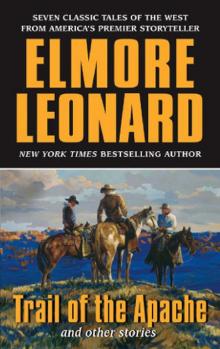 Trail of the Apache and Other Stories
Trail of the Apache and Other Stories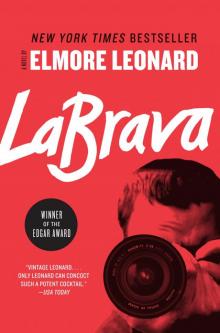 LaBrava
LaBrava Gold Coast
Gold Coast Jackie Brown
Jackie Brown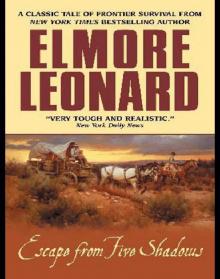 Escape From Five Shadows
Escape From Five Shadows Karen Makes out (1996)
Karen Makes out (1996)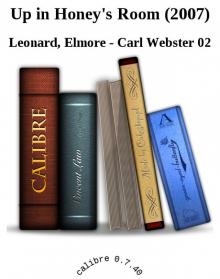 Up in Honey's Room
Up in Honey's Room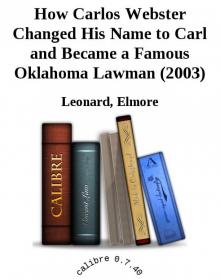 How Carlos Webster Changed His Name to Carl and Became a Famous Oklahoma Lawman (2003)
How Carlos Webster Changed His Name to Carl and Became a Famous Oklahoma Lawman (2003)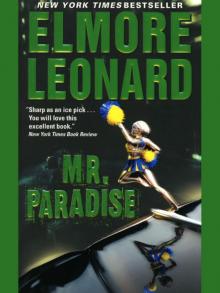 Mr. Paradise
Mr. Paradise The Hunted
The Hunted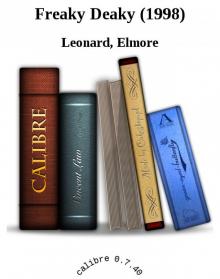 Freaky Deaky
Freaky Deaky Louly and Pretty Boy (Ss)
Louly and Pretty Boy (Ss)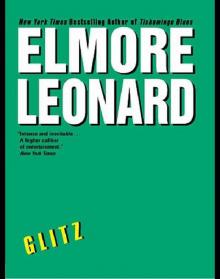 Glitz
Glitz A Coyote's in the House
A Coyote's in the House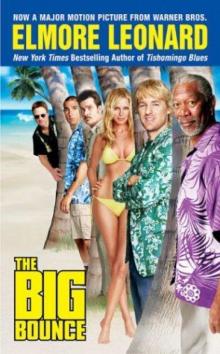 The Big Bounce jr-1
The Big Bounce jr-1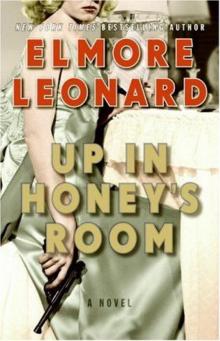 Up in Honey's Room cw-2
Up in Honey's Room cw-2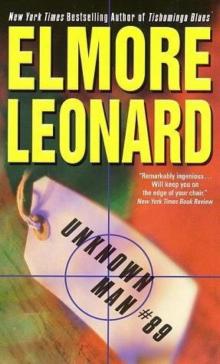 Unknown Man #89 jr-3
Unknown Man #89 jr-3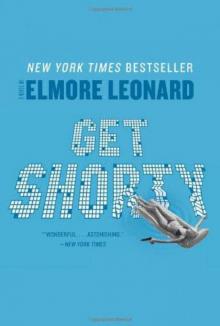 Get Shorty: A Novel cp-1
Get Shorty: A Novel cp-1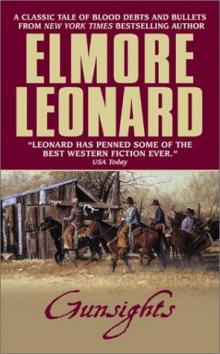 Gunsights
Gunsights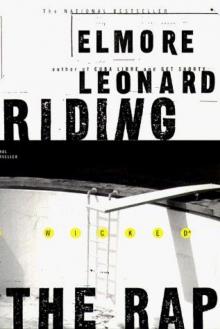 Riding the Rap rg-2
Riding the Rap rg-2